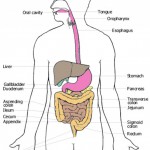HEALTH NEWS YOU CAN USE-Eating Well
By: Dr. Robert Neposlan
September’s Health Resolution….Chew Thy Food!!!
One of the most important parts of digestion, and the most overlooked, is the importance of proper chewing. The reason for this is that most peo ple don’trealize the importance that this function plays in healthy digestion. A second reason is that people are just moving too fast. Often times with our minds full of the activities and stress of the day, we’re just too “busy” inside our heads to slow down and actually enjoy the process of eating. And so, the focus of this article and this month’s (September) health resolution is on proper chewing of our food.Most people think that digestion begins in the stomach. That is WRONG. This process actually begins in the mouth. The action of chewing mechanically breaks down very large pieces of food into smaller ones. This results in the food having an increased surface area allowing larger areas of food to be exposed to SALIVA. This is important not just because it helps to lubricate the food, making it easier for foods to pass through the esophagus, but because saliva contains enzymes that contribute to the chemical process of digestion. Carbohydrate digestion begins in the mouth once in contact with saliva. Additionally, the first stage of fat digestion also occurs in the mouth with the secretion of an enzyme by glands that are located under the tongue.
ple don’trealize the importance that this function plays in healthy digestion. A second reason is that people are just moving too fast. Often times with our minds full of the activities and stress of the day, we’re just too “busy” inside our heads to slow down and actually enjoy the process of eating. And so, the focus of this article and this month’s (September) health resolution is on proper chewing of our food.Most people think that digestion begins in the stomach. That is WRONG. This process actually begins in the mouth. The action of chewing mechanically breaks down very large pieces of food into smaller ones. This results in the food having an increased surface area allowing larger areas of food to be exposed to SALIVA. This is important not just because it helps to lubricate the food, making it easier for foods to pass through the esophagus, but because saliva contains enzymes that contribute to the chemical process of digestion. Carbohydrate digestion begins in the mouth once in contact with saliva. Additionally, the first stage of fat digestion also occurs in the mouth with the secretion of an enzyme by glands that are located under the tongue.
The act of chewing and the presence of adequate amounts of saliva also trigger another critical function and that is the relaxation of a muscle at the end of the stomach, the pylorus muscle. This muscle has receptors on its cells walls which monitor the presence of saliva. This muscle must relax in order for food to leave your stomach and pass into your small intestine. Sufficient saliva from optimal chewing helps relax the pylorus, and in this way, helps your food move through your digestive tract in a healthy fashion.
Another important reason that food should arrive in the stomach in small ground up pieces is that the majority of proteins are digested in the stomach; it is therefore very important for food particles to be arriving in smaller particles. Again, smaller particles allow for a greater surface area of food. A greater surface area provides for more efficient use of digestive juices (enzymes). However, if food enters the stomach in portions too large too pass, the stomach must secrete excess digestive enzymes and this causes a problem. The stomach essentially becomes a holding tank until the body produces enough digestive juices to breakdown the food. Ulcerations of the stomach lining, acid reflux, and hiatal hernias are just some of the potential issues which may develop.
The contribution of proper chewing to good digestion does not stop there. If food escapes the stomach and is not well digested, not only do nutrients not get extracted from the food but it also becomes fodder for bacteria in the colon which can lead to bacterial overgrowth, flatulence and other symptoms of indigestion.
Some helpful tips to keep in mind when eating and ensure proper digestion are:
- Set aside enough time for each meal. If at all possible avoid “eating on the run”.
- Eat in a relaxed atmosphere. Avoid stressful settings, loud music, television and heated conversations. These settings can influence
 you to eat faster and be less focused on the actual activity and enjoyment of eating.
you to eat faster and be less focused on the actual activity and enjoyment of eating. - Start the process of better chewing by starting with smaller pieces. Cut your food into smaller, more manageable portions before placing them into your mouth.
- Chew each mouthful thoroughly at least 25-50 times or until you absolutely cannot recognize what is in your mouth (texture/content). This ensures adequate release and coating with saliva!!
- Semi liquid foods like yogurt should also be chewed. Swish fluids around in the mouth also to give the glands a chance to secrete their saliva/enzymes. This only happens when you chew!!
The benefits of thoroughly chewing your food will extend beyond improved digestion. It will cause you to slow down when you are eating, making more space for the enjoyment of your meal. It takes time for the body and brain to communicate with each other. By properly chewing you will feel fuller faster, eat less, enjoy more and in the end…live healthier!!! And that my friends….is the reason for these articles and this month’s resolution.
Until next week,
Eat well
Dr. Rob
